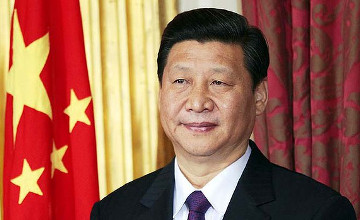Britain & China's 'win-win' with Xi Jinping's visit
- By John Ross
 0 Comment(s)
0 Comment(s) Print
Print E-mail China.org.cn, October 16, 2015
E-mail China.org.cn, October 16, 2015
|
Chinese President Xi Jinping is scheduled to visit the United Kingdom from October 19 to 23. |
Xi Jinping's state visit to Britain from October 19 to 23 is important in itself, clearly illustrates the basis for mutually beneficial relations between different countries and shows principles for overcoming problems between states.
There are striking differences between China and Britain. China has the world's largest population, the world's largest economy in Parity Purchasing Powers (PPPs), and is a country increasing in global weight and clearly only at the beginning of its rise. The UK has approximately one-twentieth the population of China and a significant economy although outside the 'superheavyweight' league of the US and China - its GDP being 10th in the world in PPP terms.
For many centuries Britain was the world's largest economy and most powerful state, but this position has been taken by the US and increasingly by China. Thanks to Britain's long period of development it retains a standard of living China is still growing towards – Britain's per capita GDP in PPPs is almost three times as high as China's.
However, it can be not national similarities that can create the most fruitful interaction but differences. Xi Jinping's visit will illustrate that.
Starting with the economy, China has become the world's industrial producer, the largest goods trading nation and runs a large surplus on manufactured trade. Britain has undergone one of the world's sharpest declines of manufacturing as a proportion of its economy and has been running deficits on manufactured trade for decades; however, it has a large trade surplus in financial and other services.
Even within manufacturing the contrast is striking - Britain's remaining manufacturing sector is concentrated in very high value added products, such as pharmaceuticals, while China is the world's most competitive producer of an increasingly broad range of manufactured products. The result is the two economies are complementary and vividly illustrate the international trade principles of division of labour and comparative advantage.
Due to these complementary features the economic interaction between the two countries is dynamic. Britain is China's second largest EU trading partner, while China is Britain's fourth largest trading partner. Britain is the second largest recipient of China's foreign investment within the EU and the second largest EU investor in China. Trade between the two countries in 2014 rose by 15 percent.
The UK now sees opportunities to use its position in global financial services to win Chinese business. London is the world's largest foreign exchange dealing centre - bigger than New York and Tokyo combined. This puts London in a strong position to help establish the RMB as an international currency, a development also in China's interest. It is reported London will become the first center outside China in which Chinese government RMB denominated debt will be issued.







Go to Forum >>0 Comment(s)